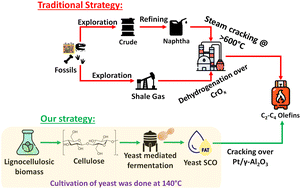Catalytic cracking of yeast-borne single-cell oil for the production of small-chain olefins over a PtSn/alumina catalyst†
Abstract
The ever-growing demand for sustainable energy and chemicals associated with declining fossil reserves motivates the quest for alternative feedstocks and processes. Short-chain olefins have numerous end-uses in the polyolefin industry and need to be supplemented or integrated with an alternative process to meet future demands. This work demonstrates that single-cell oil (SCO) derived from the oleaginous yeast Rhodotorula mucilaginosa IIPL32 could be a renewable feedstock for olefin production. A PtSn/alumina catalyst provided 60–70% gas yield, which consisted of ∼55–60% C2–C4 olefins. High selectivity to C2–C4 olefins is attributed to the selective catalytic cracking of long-chain lipid molecules over nanosized PtSn/alumina and the synergy between surface acidic sites and reducible Pt species, which improves the chemical stability and quality of the resulting gaseous hydrocarbon.



 Please wait while we load your content...
Please wait while we load your content...